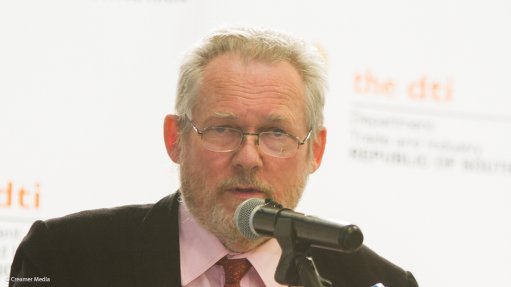
Trade and Industry Minister Dr Rob Davies
Photo by: Duane Daws
Amid growing global economic uncertainty and volatility, it has become ever more imperative for South Africa to industrialise, diversify and break its dependence on exporting its raw resources.
Even if the country faced a better economic climate, there was an urgent need to deal with the deep-seated challenge of the country being a producer and exporter of primary minerals rather than value-added products, Trade and Industry Minister Dr Rob Davies said on Tuesday.
“It is important that we move up the value chain,” he told delegates at the Manufacturing Indaba, in Kempton Park.
This came as the UK on Friday decided in a referendum to leave the European Union (EU) – commonly referred to as Brexit – sending a ripple of shocks across the world, leading to some $3-trillion in value being wiped off global stocks and “hitting the heart” of an economy such as South Africa’s.
Not only had the move exacerbated the impact a global slowdown had had on South Africa’s mineral export prices, but it would also affect trade with the EU.
Davies said he was confident of finding a way to retain the country’s eighth-largest trading partner, accounting for some 4% of total trade.
With South Africa’s exports to the UK reaching R41-billion and imports from the UK reaching R35-billion in 2015, the UK remained an important trading partner for the country.
“There can be no denying the impact this decision has had,” Davies pointed out.
However, there were no immediate implications for South African exports to the UK, as the rights and obligations under the existing EU treaties would continue over the two-year period required to negotiate the Brexit.
The treaties comprised the Common International Trade Policy, which included the current free trade agreement between South Africa and the EU, called the Trade, Development and Cooperation Agreement, and the Economic Partnership Agreement.
South Africa’s Presidency assured that government would consider all the options available to it and would start engagements with the UK.
Post-Brexit, government noted that options open to the UK included joining the European Free Trade Area, which held free trade agreements with the EU and the Southern African Customs Union (Sacu), and the possibility of Sacu and the UK negotiating a bilateral free trade agreement.
Meanwhile, while South Africa had remained resilient during the financial meltdown of 2008, it had still cost the country one-million jobs.
The current muted global economic environment, however, contained “features” that were far more serious for countries like South Africa.
It was time to take advantage of the weak rand to pursue value-added exports, particularly to Africa.
“We still have a long way to go,” Davies said, but it was possible for South Africa to increase its value-added exports, he added, highlighting that South Africa’s vehicle exports now accounted for 14% of all exports.